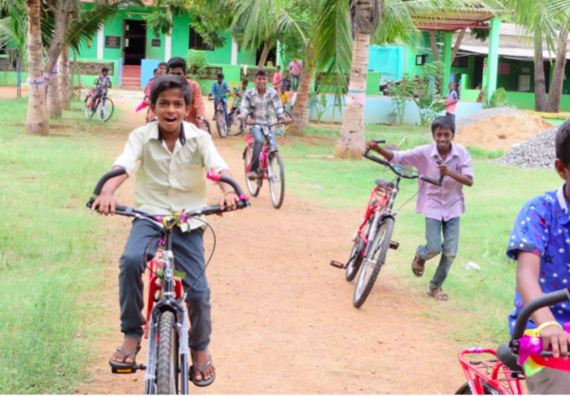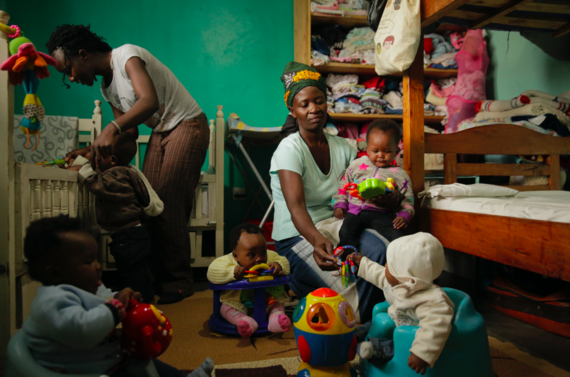Last month, J.K. Rowling sent sent out a series of tweets denouncing the practice of volountourism in orphanages, and the support of orphanages in general. It is risky to make broad statements against orphanages, hereafter referred to as children's centers, that often serve as community hubs where vulnerable children can seek refuge. The reasoning why children's centers may be necessary cannot be looked at in either black or white, because there are many bad ones out there, we need to eliminate all of them. Wouldn't it be easy if things worked that way? I believe certain children's centers have their place in society when they offer protection, shelter, and care to vulnerable children who would otherwise end up on the street, at risk of being trafficked, continue to be abused in all forms, or remain outcast from their communities. By our definition, 'vulnerable children' refers to any child that has or is at risk of suffering abuse, being trafficked, abandoned or otherwise in imminent danger due to lack of parental care.
As an aside, I am a huge fan of J.K. Rowling - of course her incredible talent as an author, but also her commitment to vulnerable children. With respect to volountourism, I absolutely agree that volunteers should not be used as replacement for qualified, committed, and local caretakers that are able to provide stable support to those children that need it. But in countries such as Kenya, the government itself relies on privately operated children's centers to be their equivalent of Child Protective Services(CPS) in the United States, which provides social services to vulnerable children (foster care, adoption, or group homes) at a cost of over 100 million per year. The government of Kenya spends nowhere near that amount, and all the financial burden is placed on the centers, which are responsible for not only caring for vulnerable children, but documenting why they were placed in their home, as well as all efforts to reunite them with their families or communities.

Boys from the Christ Faith Children's Home, which has a community outreach program to support single mothers
You see, if we want to eliminate the existence of children's centers, we have to get deeply involved in the issues and challenges specific to each society. We have to tackle extreme poverty by making quality education readily available, as well as providing jobs, especially to girls and women as they are the primary drivers of economic growth. We have to tackle deep-rooted cultural traditions such as child marriage and FGM, which cause many girls to leave their homes and seek refuge in a children's center, to avoid being victims of such harmful practices. In order to stop the abandonment of newborns in the streets of many slums, we have to provide education and awareness of the consequences of being sexually active, as well as accessible contraceptive or family planning options to young adults who commit these acts in desperation. We have to keep an eye out for and shut down those orphanages that pop up simply to recruit children living in poverty with promises of a better life, only to be exploited to the volontourism so popular in the west, which also places these children in constant danger of an ever-revolving door of strangers. Tack onto all of this HIV/AIDS, abuse, and the rare (but it does happen) occasion where both parents actually do pass away, and we have an extremely complex list of issues we need to tackle before we can confidently say there is no need for an orphanage, anywhere, to exist. Shutting all of them down without understanding the way they operate in local communities, is like ripping the band aid off before the cut has begun to heal.

Babies at the Good Samaritan Home in the Soweto Slum of Nairobi. All of them have been placed at the center after being abandoned in the streets of the slum. They are being cared for until they are able to be adopted.
In my research in the field, I've come across both the bad orphanages and the ones that are going above and beyond for their children and their families - such as the Simama Project, a children's center with a home based program which supports the education costs (tuition, books, etc) of 100 children who are living at home with their families - a way for these children to be able to attend school rather than be sent to an orphanage because their parents know they will receive an education there that they otherwise could not afford. Or the Christ Faith Children's Home in India, which has a housing project for single mothers where they can live with their children in the center, while learning job skills, which keeps these women and their children together.
These are just a few examples of why I strongly feel that in many countries, many orphanages are serving a crucial role in their communities. They do save the lives of many children, and they provide services to help families in times of need. As for the long term strategy, at what point does the burden of care and alternatives continue to be placed on NGOs and the orphanages themselves? When will local governments step up to the plate and start providing the social services and resources that their communities desperately need? As Ms. Rowling tweeted, these "countries need social care and health systems that keep families together" And while we start working on the long term strategy, I ask people to think twice before calling for all orphanages to be shut down. Take a look at what happened when Rawanda shut down all orphanages in 2011, as an example of the harm this can do when there is no strong back up plan. For anyone wanting to support vulnerable children, do your due diligence, as with any donation you give. Research the center or NGO, how involved they are in the local community, how many children they house, what their re-integration rate is, the primary reasons children end up there, etc. Or start supporting those organizations and initiatives that are working towards solving the societal issues that cause children to live in orphanages: women's rights, extreme poverty, HIV/AIDS, and sexual Education.
We need to stop depicting the existence of orphanages as either black or white, as an all in or all out decision- because the truth is, the reasons orphanages exist are muddled in a gray, murky mire full of each society's unique history of repression, traditions, and corruption that have ultimately hurt the most vulnerable of their citizens: children.